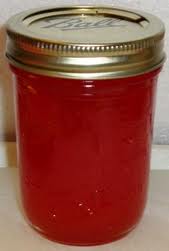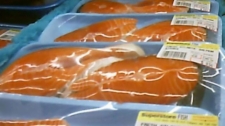Have Canadian officials resolved their federal-provincial-local turf issues involving food safety outbreaks with clear guidelines on when to issue public warnings and a clear commitment to place public health above corporate .jpg) interests?
interests?
Doubtful.
The latest rolling recall involves products made by Toronto-based G. Brandt Meat Packers Ltd.
The British Columbia Centre for Disease Control got things rolling on July 14, 2010, when it confirmed 10 cases of Salmonella Chester in residents who consumed headcheese which had been purchased from various stores throughout the province from mid- to late June.
Headcheese is a deli product made from meat from the head of a pig, combined with gelatin and spices.
All anyone would say at the time was that B.C.’s Freybe Gourmet Foods Ltd. was voluntarily recalling the product, which was produced by a third-party manufacturer.
On July 22, 2010, the mystery manufacturer was indentified as the feds and Brandt announced there were now 18 people sick and people shouldn’t eat headcheese from Brandt.
On July 28, 2010, the Canadian Food Inspection Agency issued an alert advising Canadians not to eat Freybe brand Ham Suelze – Frebe being the same distributor of the salmonella headcheese – but no mention was made of who produced the mystery ham, and CFIA added there were no reported illnesses associated with the consumption of this product.
I’m guessing the Toronto Star made some phone calls, and on Saturday published a story reporting that G. Brandt Meat Packers Ltd. was closed for cleaning and that, “all Brandt cooked meat products bearing Establishment number 164 produced from May 30 up to and including July 30 are affected” and were potentially contaminated with either salmonella or listeria or both.
Later on July 31, CFIA published a huge list of recalled products all from the Brandt plant, and said the products may be contaminated with “foodborne pathogens” and insisted again that no one had gotten sick.
So later on July 31, 2010, the Public Health Agency of Canada issued its own release, stating,
“The Public Health Agency of Canada and the Canadian Food Inspection Agency (CFIA) is advising Canadians to avoid eating the cooked ready-to-eat meat products manufactured by G. Brandt Meat Products Ltd. listed in the CFIA recall notice.
The only illnesses associated to date with Brandt products have been caused by Salmonella Chester in Freybe brand headcheese.
(1).jpg) Avoiding eating these products is especially important for Canadians at high risk of getting seriously ill from food-borne (sic, other agencies spell it foodborne) illness:
Avoiding eating these products is especially important for Canadians at high risk of getting seriously ill from food-borne (sic, other agencies spell it foodborne) illness:
People 60 years and older.
Very young children.
People with weakened immune systems, such as those undergoing cancer treatment or who have HIV/AIDS or other chronic medical conditions.
Pregnant women, due to risk of harm to the fetus.
Besides terrible grammar, why hasn’t PHAC, or Health Canada, or CFIA said anything about the morons at Toronto’s Sick Kids’ Hospital who said that pregnant women could eat all the cold-cuts and ready-to-eat foods they want. This is wrong and dangerous.
A cluster of Samonella Chester was made publicly known by B.C. health types on July 14. It took until on or about July 30, 2010, for the feds to shut down the Toronto-based manufacturer. My guess is the plant had serious food safety issues. But that’s just a guess. The bureaucrats will never tell Canadians. And if they do, they’ll obfuscate, delay, patronize and pander.
Or just get it wrong.
 with Diarrhetic Shellfish Poisoning biotoxin or DSP.
with Diarrhetic Shellfish Poisoning biotoxin or DSP.
 Galanis, Physician Epidemiologist with BCCDC, an agency of the Provincial Health Services Authority. “Botulism is a serious illness, and it is critical that anyone who purchased this item discard it immediately.”
Galanis, Physician Epidemiologist with BCCDC, an agency of the Provincial Health Services Authority. “Botulism is a serious illness, and it is critical that anyone who purchased this item discard it immediately.”.jpg) obtained on Sept. 9.
obtained on Sept. 9. and if they smelled okay, we re-wrapped them and put a new best-before date, extending usually by about five days. When we were told to change the best-before dates, I stopped buying any meat products from the Real Canadian Superstore."
and if they smelled okay, we re-wrapped them and put a new best-before date, extending usually by about five days. When we were told to change the best-before dates, I stopped buying any meat products from the Real Canadian Superstore." Dec. 5, but when it was re-wrapped, the new best-before date was Dec. 9.
Dec. 5, but when it was re-wrapped, the new best-before date was Dec. 9..jpg) best-before dates are maintained. We have reinforced this policy with the pertinent store…. We apologize if there is any concern on the part of our customers."
best-before dates are maintained. We have reinforced this policy with the pertinent store…. We apologize if there is any concern on the part of our customers.".jpg) an outbreak of illness related to eating uncooked Pacific Coast oysters is being caused by a norovirus.
an outbreak of illness related to eating uncooked Pacific Coast oysters is being caused by a norovirus..jpg) interests?
interests?(1).jpg) Avoiding eating these products is especially important for Canadians at high risk of getting seriously ill from food-borne (sic, other agencies spell it foodborne) illness:
Avoiding eating these products is especially important for Canadians at high risk of getting seriously ill from food-borne (sic, other agencies spell it foodborne) illness:.jpg) The headcheese was distributed nationally by Freybe Gourmet Foods Ltd., but it is sliced and packaged at deli counters in various stores so consumers may not be aware of the brand they bought.
The headcheese was distributed nationally by Freybe Gourmet Foods Ltd., but it is sliced and packaged at deli counters in various stores so consumers may not be aware of the brand they bought. province from mid- to late June.
province from mid- to late June. The phoney inspectors sometimes threaten fines for failing to schedule inspections.
The phoney inspectors sometimes threaten fines for failing to schedule inspections.